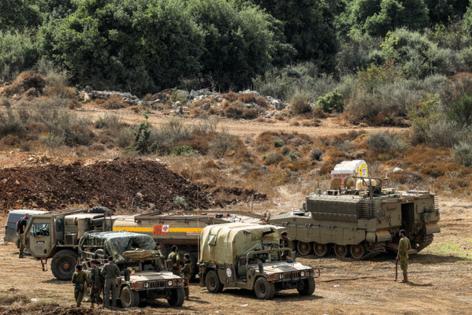Israeli forces enter Lebanon, sparking Hezbollah strikes
Published in News & Features
Israel sent soldiers into southern Lebanon in a major escalation of its weeks-long campaign against the Iran-backed Hezbollah militant group, increasing the risk of a wider Middle East conflict.
Troops began what Israel said were “targeted ground raids” shortly before midnight local time alongside airstrikes in Beirut’s southern suburbs, and the army later reported “intense fighting.” Lebanese media said heavy shelling took place in four villages just across the border. There were explosions in the coastal town of Ras Naqoura.
Hezbollah fired a salvo of rockets in response and millions of Israelis moved to shelters, the Israel Defense Forces said, with sirens sounding in the center of the country, including Tel Aviv. The militants also fired at soldiers in an Israeli border town. The United Nations urged both sides not to target the more than 10,000 peacekeepers stationed in southern Lebanon.
Amid calls for restraint from the U.S., European and Arab states, Israel emphasized its first ground push into neighboring Lebanon since a 2006 war would be “limited,” suggesting it isn’t planning to go deep or hold territory for long. The incursions follow days of intense air strikes intended to eliminate Hezbollah’s leadership and destroy its weapons stockpiles.
Still, Western and Arab powers are concerned Israel could get bogged down. While it has overwhelming military superiority, there’s a danger of being drawn into protracted fighting and the creation of another long-term “security zone” — Israel’s term for its 1982-2000 occupation of southern Lebanon. That in turn could spark a wider regional war involving Iran, Hezbollah’s main sponsor.
Israel warned Lebanese residents not to go south of the Litani River, which lies 20 kilometers (12 miles) from the border with Israel. Under a United Nations Security Resolution after the end the 2006 war, the Lebanese army was due to be deployed to the area to end Hezbollah’s armed presence, but it was never implemented.
The U.S. said it “agreed on the necessity of dismantling attack infrastructure” near the Israeli border. The Pentagon said that would stop Hezbollah from conducting the type of attack on Israel that Palestinian militant group Hamas carried out on Oct. 7 last year, which triggered the ongoing war in Gaza.
At the same time, President Joe Biden’s administration is worried the Israeli military may overreach, said a U.S. official, who asked not to be identified discussing private deliberations.
Hezbollah’s leadership and facilities have been rocked by the relentless Israeli air strikes of recent weeks. On Friday, its long-standing leader, Hassan Nasrallah, was killed in a strike on Beirut. The Israeli military believes it has now eliminated all but one of Hezbollah’s top 11 commanders.
Israel is “saying it’s limited,” Randa Slim, a senior fellow at the Middle East Institute, told Bloomberg television on Tuesday. “But the other side, Hezbollah, will also have a say in defining what kind of war it’s going to be, how limited it’s going to be, how bloody it’s going to be and how long it will last.”
Israeli National Security Minister Itamar Ben Gvir, a far-right ally of Prime Minister Benjamin Netanyahu, said Israel should not stop until it’s done everything to “crush” Hezbollah. He has threatened to quit the coalition if a truce is reached with the group, as he had previously done about the prospects of a cease-fire in Gaza.
Hezbollah, which like Hamas is designated a terrorist organization by the U.S., started firing on Israel on Oct. 8 last year, prompting counter-strikes. Israel is trying to ensure the tens of thousands of Israelis displaced by the previously contained skirmishes can return home, and made that an official war objective last month.
While the conflict in Gaza against Hamas continues and truce talks remain stalled, the intensity of fighting has eased as the Palestinian militants — also backed by Iran — have suffered heavy losses. That has allowed Israel to focus more on Hezbollah.
The ground operation in Lebanon started a week before the one-year mark of Hamas’ attack on southern Israel, which killed 1,200 people and saw 250 abducted. About 100 people are still held captive by Hamas.
Israel’s air and ground campaign in Gaza has killed more than 41,000 Palestinians, according to the Hamas-run health ministry in the territory, stoking widespread anger in the region and other parts of the world.
Biden has been keen to avoid an Israeli ground incursion into Lebanon and last week announced a plan — along with France — for a 21-day cease-fire. But Netanyahu struck a defiant tone on Friday when he addressed the United Nations in New York, saying Israel had “no choice” but to press on with its military attacks.
Hours later, Nasrallah was killed in a strike ordered by Netanyahu. That came alongside massive airstrikes across Lebanon that killed many senior Hezbollah commanders, but also hundreds of civilians, including at least 50 children, according to Lebanese health officials.
Lebanon’s Prime Minister Najib Mikati says one million people have probably been displaced in his country, with many trying to flee to Syria. On Tuesday, he launched a $426 million flash appeal to mobilize urgent resources for civilians affected by the escalating conflict.
Hezbollah, meaning “party of God” in Arabic, is one of the world’s most-powerful non-state actors, with tens of thousands of fighters at its disposal. It’s also a political party and has substantial support among Shiite Muslims in Lebanon.
The Lebanese state has long been powerless to stop its military activities.
Israel’s air and ground attacks will likely worsen the economic and political turmoil that has roiled Lebanon for years. It has only a caretaker government because talks to elect a new president failed, inflation’s running at 35%, and the country’s in default on tens of billions of dollars of international bonds.
©2024 Bloomberg L.P. Visit bloomberg.com. Distributed by Tribune Content Agency, LLC.







Comments